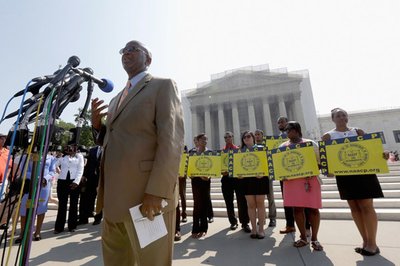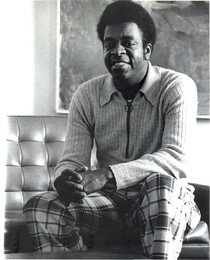The Supreme Court issued a ruling today that Section 4 of the Voting Rights Act of 1965 is no longer constitutional, overriding objections from civil rights proponents who say that it is one of the most important pieces of legislation from the civil rights era.

Field Director Charles White of the National Association for the Advancement of Colored People (NAACP) speaks at a podium outside the U.S. Supreme Court building on June 25, 2013 in Washington, DC.
Field Director Charles White of the National Association for the Advancement of Colored People (NAACP) speaks at a podium outside the U.S. Supreme Court building on June 25, 2013 in Washington, DC.
Section 4 required nine southern states to gain approval of the Department of Justice before making any changes to voting laws in their state. The states were determined based on polls taken in the 1960s to find what areas had low minority-voter turnout.
Chief Justice John Roberts, who wrote the majority opinion in the 5-4 decision, stated, “Section 4’s formula is unconstitutional in light of current conditions.”
 Lesson Plan: Constitution Day: The 1965 Alabama Literacy Test
Lesson Plan: Constitution Day: The 1965 Alabama Literacy Test
 Remembering the Voting Rights Act of 1965
The court was also expected to rule on Section 5 of the Voting Rights Act, which allows the Justice Department to preview any changes to voting laws in areas with a history of racial discrimination. However, the court did not make a decision on Section 5, allowing it to stand.
Remembering the Voting Rights Act of 1965
The court was also expected to rule on Section 5 of the Voting Rights Act, which allows the Justice Department to preview any changes to voting laws in areas with a history of racial discrimination. However, the court did not make a decision on Section 5, allowing it to stand.
-- Compiled by Carrie Waltemeyer for NewsHour Extra

Court tells Congress to write a new formula
"Our decision in no way affects the permanent, nationwide ban on racial discrimination in voting found in [Section] 2. We issue no holding on [Section] 5 itself, only on the coverage formula. Congress may draft another formula based on current conditions," he wrote, arguing that Section4 was “based on decades-old data and eradicated practices.” However, most analysts say the issue is too controversial for the current Congress to reach agreement on a formula for where federal oversight is still required.Southern states felt discriminated against
Many southern states felt that the act was discriminatory because it imposed rules in some states and not others. Many of those cities and towns now have equal voter turnout between minorities and whites.

Voter ID laws seen as new form of discrimination
The Voting Rights Act of 1965 also prohibited states from creating any voter qualifications that could make an otherwise eligible citizen unable to vote based on race. But nearly 50 years after the act was put into place, many southern states feel that is no longer needed. While times have changed, many civil rights activists point to new Voter ID laws as evidence that they are still fighting against discriminatory voting laws. In addition, many voters in large urban areas waited hours to vote, and counties were ordered to stay open into the late hours of the 2012 election. To see how some people reacted to the news around the country, check out these tweets on today's decision:Sec 4 of the Voting Rights Act is unconstitutional. 5-4. Per CJ Roberts. — SCOTUSblog (@SCOTUSblog) June 25, 2013
#SCOTUS decision in #VRA case is clear: Congress must act to protect voters from discrimination. Join the movement http://t.co/gs2SaiX2kl — Donna Brazile (@donnabrazile) June 25, 2013
Disappointed by the #SCOTUS #VRA decision. Voting rights should be expanded, not limited. — D Wasserman Schultz (@DWStweets) June 25, 2013
POWER TO THE STATES http://t.co/t4eAzYogK8 — DRUDGE REPORT (@DRUDGE_REPORT) June 25, 2013
-- Compiled by Carrie Waltemeyer for NewsHour Extra

